
|
The Last Temptation of Christ
(1988)
In Martin Scorsese's controversial, profound, challenging,
and unorthodox epic film about temptation and guilt - it was adapted
from Nikos Kazantzakis' 1955 best-selling novel of the same name,
by scriptwriter Paul Schrader (with additions from Scorsese and Jay
Cocks). The lengthy 163 minute religious drama was condemned with
charges of blasphemy for its concluding "last
temptation" sequence, and for its dualistic portrayal of a very-human,
conflicted, flawed and mortal Jesus Christ figure (Willem Dafoe)
who was faced with earthly pleasures, questions, and challenges.
The thought-provoking film also featured a fantastic
musical score by the legendary Peter
Gabriel. The film's only Oscar nomination was for Scorsese as Best
Director - he lost to director Barry Levinson's sweep for Best Picture
- Rain Man (1988). Another less prestigious Razzie nomination
was Worst Supporting Actor for Harvey Keitel portraying Judas.
The film was denounced as sacrilegious and pornographic
(for a non-explicit scene of Jesus procreating with his wife) even
before its release, although the film clearly stated in a pre-credits
disclaimer regarding the film's adaptation from the novel: "This
film is not based upon the Gospels, but upon this fictional exploration
of the eternal spiritual conflict." The author was almost ex-communicated
from the Greek Orthodox Church as a result of writing the radical,
revisionist book, and his work was frequently found on lists of banned books.
Although mostly unwarranted, many attacks were made
on the way the film depicted Jesus' humanity. In the film's first
sequence, a tormented, self-analytical, guilt-ridden and worried
Jesus explained that he was collaborating with Rome by making wooden
crosses for crucifixion so that they could kill his fellow Jews.
He in fact assisted in the crucifixion of a zealous Jew accused of
sedition against the Roman state, and nailed him to a cross.
Full of self-contempt, Jesus also feared his Messianic
destiny and hoped that by his actions, God would invoke his wrath
upon him rather than love: ("God loves me. I know he loves me.
I want him to stop....I make crosses so He'll hate me. I want Him
to find somebody else. I want to crucify every one of His Messiahs").
Jesus also consistently expressed doubts about his nature, his Messiah
nature, and his own mission in life. Later, he turned his back on
his own mother Mary, telling her "I have no family."
The film attracted protests and boycotts from religious
groups even before it reached the theatres. The resulting controversy
hurt domestic ticket sales -- its box office was only $8.9 million,
on a budget of $7 million.
- the film opened with a title card quote from Nikos
Kazantzakis's book of the same name: "The dual substance of Christ
- the yearning, so human, so superhuman, of man to attain God... has
always been a deep inscrutable mystery to me. My principle anguish
and source of all my joys and sorrows from my youth onward has been
the incessant, merciless battle between the spirit and the flesh...
and my soul is the arena where these two armies have clashed and met";
the quote was followed by the disclaimer mentioned above
- in his home town of Nazareth in the Roman-ruled
state of Judea, the cowardly carpenter and self-doubting and self-hating
Nazarene Jesus (Willem Dafoe) was introduced; he was struggling
and in torment, and was attempting to ease the pain by self-flagellation
and fasting; he was collaborating with the Romans by building wooden
crosses for the punishing crucifixion of Jewish rebels and revolutionaries;
his friend Judas Iscariot (Harvey Keitel) was frustrated with him
for helping the enemy: ("You're a disgrace. Romans can't find
anyone to make crosses, except for you! You do it. You're worse
than them. You're a Jew killing Jews. You're a coward!");
Judas was one of the Jewish rebel zealots who was regularly murdering
Roman soldiers
- wearing a nail-studded torture belt, Jesus carried
a cross-bar for the impending crucifixion of a rebel zealot Jew
charged by a Roman centurion with "SEDITIO" - for preaching that
a Messiah would rise up and defeat Rome; brothel prostitute Mary
Magdalene (Barbara Hershey), Jesus' childhood friend, approached
and spit in Jesus' face, before he assisted in nailing the young
Jewish man's hands to the cross, and blood sprayed onto his face
- that night, Jesus writhed in pain on the dirt floor
as he confessed and prayed (voice-over): "I want him to hate me.
I fight him. I make crosses so he'll hate me. I want him to find
somebody else. I want to crucify every one of his Messiahs"; Jesus' worried
mother Mary (Verna Bloom) urged her son to cast out the devil: "lf
it's the devil, the devil can be cast out", but
Jesus asked: "But what if it's God? You can't
cast out God, can you?"
- afterwards, Jesus was led to visit the
brothel of prostitute Mary Magdalene, where
he sat all day long within sight of her entertaining and having
carnal sex with numerous clients on a bed behind a thin veil; at
the end of a long day, Jesus told her - with guilt and sorrow -
that he needed her forgiveness ("I want you to forgive me"), because
of his doing "too many bad things," before he was planning to retreat into the
desert
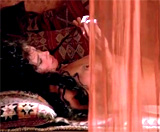
|
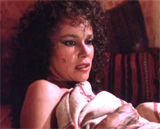
|
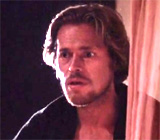
|
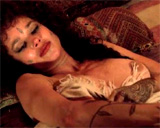
|
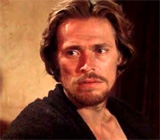
|
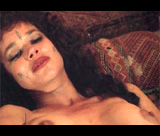
|
|
Jesus In Brothel with Prostitute Mary Magdalene
|
- Mary Magdalene refused: "Get out! Go away! ...Pay or go away ... It's
not that easy. Just because you need forgiveness, don't ask me
to do it"; she then offered herself to him by pulling down her blanket to reveal
her breasts: "If you want to save my soul, this is where you'll find it....Here's
my body. Save it. Save it"; she grasped his hand and put it on her
private parts, but he declined to be enticed by her; she accused
him of not being a man: ("You never had the courage to be a man")
and was running scared into the desert ("Now you're hanging
on to God, going to the desert to hide because you're scared");
she was sad about their relationship ("Whenever I see you, my
heart breaks") as she remembered when they were children and she
loved him: ("All I ever wanted was you. Nothing else"); she invited him to stay
with her without any touching: ("I won't touch you. You'll still
be a virgin for the desert"), but he declined
- as he ventured into the desert to pray, Jesus met
in a hut with an elderly master (Roberts Blossom) of a monastery
who enigmatically greeted him: ("I know who you are"); the next
day, the man died, and Jesus participated in his funeral ceremony
- afterwards on a cliffside, Jesus spoke to young
monk named Jeroboam (Barry Miller) who was envious that Jesus could
speak to God and was blessed, but he felt uncertain about himself:
("I don't know what God wants
from me"); Jesus was highly skeptical: "You think it's
a blessing to know what God wants?" - and speculated that
God was wrathful and wanted to push him over the cliff; Jesus admitted
his many sins, and that he was mostly motivated by Fear: ("I
want to rebel against you, against everything, against God, but
l'm afraid");
the young man attempted to encourage Jesus: "But the more
devils we have inside of us, the more of a chance we have to repent";
Jesus admitted "Lucifer is inside me" - who was trying
to instill doubts about his identity; later, after Jesus had exorcised
two cobra-snake demons from himself, Jeroboam encouraged the now
"purified" Jesus to return to the people: "You have
to go back and speak to people and share your heart...to anyone
who will listen"
- later that night, Judas
encountered Jesus with orders to kill him, but suspected that Jesus
might be the Messiah with "the
fainting spells, the voices, the visions," and the way he
felt
"pity for everything" (Jesus: "Everything's a part
of God"); Judas was
impressed by Jesus' remark that he wasn't afraid to die: ("Why
should I be? Death isn't a door that closes, it opens"); Jesus
vowed that he would speak to the people with a message of love,
and Judas should not kill him but follow him: ("Maybe
God didn't send you here to kill me. Maybe he sent you here to
follow me"); Judas answered: ("I'll go with you until
I understand. But if you stray this much from the path, I'll
kill you")
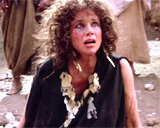
|
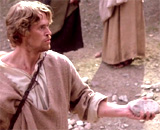
|
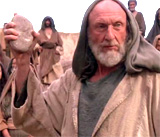
|
|
Jesus Defending Mary Magdalene From Being Stoned
to Death ("Who has never sinned, who?") - Especially Challenging
Zebedee (Irvin Kershner)
|
- as they entered the village, Jesus
and Judas saw Mary Magdalene about to be stoned for breaking the
Sabbath; Jesus reacted by preaching to the crowd to dissuade them
from judging her: ("Which one of you people has never sinned? Whoever that is, come up here!
And throw these!") - he especially challenged Zebedee (Irvin Kershner) for his specific
sins: "There is a God. He's seen you cheat your workers.
He's seen you with that widow, what's her name?...Judith. Aren't
you afraid God will paralyze you if you lift that stone?"
- afterwards, Jesus called for all the people to come closer to him to listen: ("Come
closer, so you can hear"), and delivered a small-scale "Sermon on the Mount" with
his familiar story-telling and teachings (about a farmer spreading
seed on different surfaces) - preaching "Love one another"; it was his
first public appearance; he also spoke of the "Beatitudes"
("...you'll all be blessed because heaven is yours!"); some misinterpreted
his words and shouted "Kill them," but he urged: "I said love"
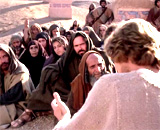
|
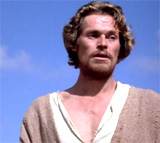
|
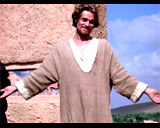
|
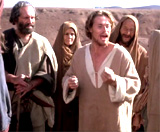
|
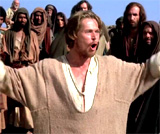
|
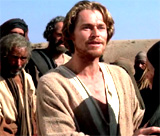
|
|
"Sermon on the Mount" - "Love one another" and the
"Beatitudes"
|
- as the gathering broke up, the two sons of Zebedee:
John (Michael Been) and James (John Lurie) - against their father's wishes, decided to
be Jesus' followers or disciples; although Mary Magdalene asked
to join him, Jesus preferred for her to stay there, and then removed
one of her sandals and wiped her foot; his numbers increased with
other apostles: fishermen Peter (Victor Argo), James and Andrew
(Gary Basaraba) and others; in a clever dissolving montage, Jesus'
small entourage of followers quickly grew
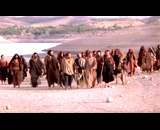
Growing Numbers of Jesus' Followers
|
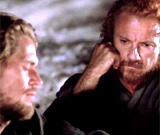
Judas Admitting That the Zealots Had Ordered Him
to Kill Jesus
|
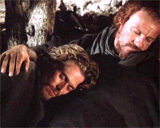
Judas Sleeping Next to Jesus
|
- while sleeping out under the stars one night, Judas
argued with Jesus about how to proceed, and worried that his disciples
were weaklings: ("The other day you said, if a man hit you,
you'd turn the other cheek. I didn't like that"); they spoke
about whether to first free Israel or to free the soul; Judas was
a true revolutionary: "First you free the body, then you free the spirit! The Romans
come first"; however, Jesus preached that one must first change
the spirit or soul of oneself - with love, or otherwise nothing
would happen: ("If you don't change the spirit first, change
what's inside, then you'll only gonna replace the Romans with somebody
else, and nothing ever changes...You've got to break the chain
of evil...with love"); Judas admitted that he was ordered by the Zealots to kill Jesus,
but had changed his mind and was waiting to see if Jesus was
the Messiah ("the One"); Jesus pondered the thought: "How
could I be the Messiah?", and became weak and afraid; Jesus asked
Judas to stay and sleep next to him
- during the night, Jesus awoke, began eating an
apple and threw some of the seeds onto the ground; suddenly, the
seeds sprouted into a full grown apple tree bearing fruit, revealing
his tremendous powers
- after gathering disciples to himself, Jesus sought
to find answers about his destiny by meeting up with John the
Baptist (Andre Gregory) in Judea who was preaching in the desert
about the coming Messiah; in the midst of drum-beating and followers
working themselves into a frenzy, the long-haired fanatical Baptist
abruptly turned toward Jesus and asked: "Who are you?"; Jesus confirmed
that Isaiah had prophesied that John was there to prepare
the way of the Lord; John asked if Jesus was the Lord, but Jesus
turned the question around: "I don't know. Tell me" - and demanded
to be baptized; John was hesitant but performed the baptism and then hugged Jesus
- that evening, John and
Jesus expressed differing views about what God demanded - should
they defeat the Romans with an axe or conquer them with
love?; the Baptist argued for anger: "What I can't love, I attack.
God demands it...God demands anger"; Jesus responded: "That's not
the answer"; Jesus was told to venture further into the desert
where he would receive clarity from God: ("The
God of Israel is the God of the desert. If you want to speak to
him, then you'll have to go to the desert")
- deep in the desert, Jesus
drew a circle and sat in it - vowing to find answers ("Whatever
path you want, I'll take"); he soon found himself resisting temptation
and trickery from the soothing female voice of Satan (Leo Marks)
in the form of a hooded cobra: ("Why
are you trying to save the world? Aren't your own sins enough for
you? What arrogance to think you can save the world. The world doesn't have
to be saved. Save yourself"); after 10 days of fasting,
the tempting Satan also appeared in the form of a lion and as a pillar
of fire; Satan also offered: "You are his son. The only Son of God. Join
me. Join me. Together we'll rule the living and the dead," but
Jesus continued to strongly rebuff and resist; when an apple
tree appeared before him and he took a bite from a luscious apple,
he had a vision of John the Baptist telling him to return to humankind:
"Don't be afraid. You are the One. My work is done. Now I can die.
The Lord wants me to tell you to stand up. His day is here!"; Jesus
stood up and as a sign of conquering his hunger, he chopped down
the tree with an axe given to him by John
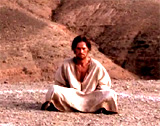
|
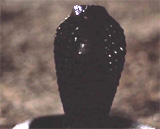
|
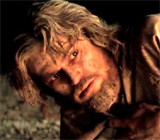
|
|
In the Desert - Jesus Resisting the Temptations of Satan In Many Forms
|
- after his difficult sojourn in the desert,
Jesus returned to the home of the two sisters of Lazarus (Tomas
Arana): Mary (Randy Danson) and Martha (Peggy Gormley), where
they encouraged him to stop fasting and praying; both of them suggested
that he marry, establish a home or family and have children,
but Jesus reacted: "I'd like it, but I'll never have it";
they happened to mention that John the Baptist
was beheaded by King Herod during his absence
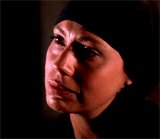
Mary (Randy Danson)
|
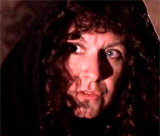
Martha (Peggy Gormley)
|
- meanwhile after being absent from Jesus for over
a month, Jesus' disciples in a Roman cave were edgy and grumbling
about their missing Master, and also worried: "Now they say they're
going to kill everyone who was baptized"; Jesus suddenly appeared
amongst them, with fire in his eyes: ("John baptized with water
and they killed him. Now I baptize with fire...I'm inviting you
to a war"); he discussed his mission and to illustrate his lesson,
Jesus pulled his beating heart out of his chest to show that God
was inside each and every one, and that Satan was outside and could
be cast out: ("This is my heart. Take it. God
is inside of us. The devil is outside us, in the world all around
us. We'll pick up an axe and cut the devil's throat. We'll fight
him wherever he is"); his message was now similar to John
the Baptist's as he held up an axe - he promised to cast out Satan
even in the temple, and asked for full dedication and sacrifice
from his disciples: ("If you have a family, leave them. I believed
in love. Now I believe in this!"); Judas was the first to step
forward and pledge allegiance to Jesus, and to kiss his feet
- in Samaria, Jesus began to cast out evil spirits
from deranged and possessed ndividuals and to perform other miracles;
it was soon rumored that he was a miracle-working Messiah; he healed
a blind man, and turned water into wine at a wedding feast in Cana
for Nathaniel's cousin; in Nazareth, he greeted his own townsfolk
and announced that as the Messiah, he was tearing down everything
and bringing something new and miraculous: ("God. The world
of God"); he suggested that everyone give up their riches
and join him on his trek to Jerusalem: ("Don't waste your
life. Come with me"); some bystanders considered him "insane" or
a possessed demon; and then, when his mother Mary requested that
he return back home, Jesus denied that she was his mother: ("I
don't have a mother. I don't have any family. I have a Father,
in heaven"); she was devastated, and couldn't be comforted by a Woman (Doris
Von Thury) who claimed she had seen armies of blue-winged angels
behind Jesus
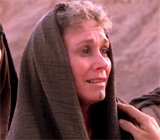
Jesus Denying Mary Was His Mother
|
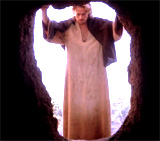
|
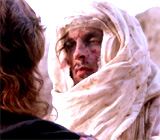
|
|
Jesus Raising Lazarus From the Dead
|
- Jesus' greatest feat or miracle was to resurrect
the two Mary's brother Lazarus who was buried three days
earlier; at the entrance to the cave-tomb opening, Jesus commanded: "Roll
away the stone....I call you here" - and shortly later, a decomposed
Lazarus appeared in his burial wrappings - Jesus appeared truly
shocked by his own miracle
- in Jerusalem, Jesus reacted with an angry outburst
at the moneychangers in the temple and confronted the rabbis-priests
- he told them he had not come to bring peace but the sword, and
predicted the temple would be torn down: ("This
is my Father's house! It's a place of worship, not a market!...God
doesn't need a palace. He doesn't need cypress trees or dead animals!
He doesn't need shekles!"); one of the rabbis ( (Nehemiah Persoff)
explained the need for money-changers: "You expect people to pay
the tax with Roman coins. They have images of false gods on them!
You want pagan gods in the temple? All foreign coins have to be exchanged
for shekels. That is the law"; Jesus responded: "I'm
throwing away the law. I have a new law and a new hope....How can
I presume? Because I'm the end of the old law and the beginning of
the new one....When I say 'I' Rabbi, I'm saying 'God.'...Didn't they
tell you? I'm the saint of blasphemy. Don't make any mistakes, I
didn't come here to bring peace, I came to bring a sword!...Me killed?
Listen to me. This temple will be destroyed in three days, torn down
to the ground! There won't be one stone left to build with! You think
God belongs only to you? He doesn't. God's an immortal spirit who
belongs to everybody - to the whole world! You think you're special?
God is not an Israelite!"
- after witnessing Jesus' blasphemous claims that
he was God before the Rabbi, anti-Rome zealot Saul (Harry Dean Stanton)
pulled Judas aside in the crowd and privately asked why he
didn't kill Jesus: ("What are you doing with this magician? You had orders to kill him and
you haven't done it. Now he acts like a prophet and you follow him")
- shortly later, Saul spoke with Lazarus, who said
"I like the light" and then, when asked which he liked better -
life or death - he answered: "I was a little surprised.
There wasn't that much difference"; Saul stabbed
him to death, because Lazarus was proof of Jesus' miracle-working
- Judas (who was now regarded
by Jesus as his strongest follower) explained to Jesus why he came
with him to Jerusalem - to be part of the coming revolution against
Rome; Judas didn't understand when Jesus said he was going to die
willingly on the cross ("Judas, I
am the lamb. I'm the one who's going to die"),
because then he couldn't be Judas' Messiah: ("You mean you're
not the Messiah?...If you're the Messiah, why do you have to die?...Every
day you have a different plan! First it's love, then it's the axe,
and now you have to die"); Jesus reaffirmed the divine plan: "I
have to die on the cross and I have to die willingly"; Jesus added:
"We have to go back to the temple," and then after his death on the
cross, he would "come back to judge the living and the dead";
Judas was very skeptical of Jesus' presumed indecisiveness
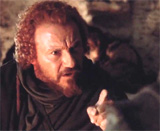
Judas Angry at Jesus For Contradictory Messages
|
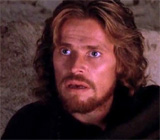
Jesus to Judas: "I have to die on the cross, and I have
to die willingly"
|
- as the disciples were led back to Jerusalem,
some thought Jesus was on a mission to destroy the temple;
Judas shouted: "King of the Jews!" as palm branches were
laid before Jesus riding on a colt; Jesus began
to violently overturn the tables of vendors at the Temple, but
then in voice-over asked himself: "Lord, I hope this is what you
want. Let me die here. Please let it happen fast while I have the strength";
he spoke to his followers: "I'm
here! And I'm going to baptize everybody with fire!"; the group
found themselves surrounded by Roman guards, when Jesus spoke again:
"I am here to set fire to the world...I'm waiting, too. Give me
an axe, not the cross. Let me die like this"
- Judas still believed that Jesus was there to conquer the Romans and baptize
everyone with fire, and he goaded him on: ("We
came to fight, not to die! Master, we knew it would be like this.
This is the way. Do it"); at a crossroads in his life, Jesus
saw his hands were bleeding and he became visibly weak as Judas
helped him walk away - it was a sign to Jesus of his destiny on
the cross to bring salvation; he re-emphasized to Judas: "I
wish there was another way. I'm sorry, but there isn't. I
have to die on the cross...You have no choice, neither do I. Remember,
we're bringing God and man together. They'll never be together unless
I die. I'm the sacrifice"
- remarkably, Jesus instructed Judas to kill him
or give him up to the Romans - to fulfill Judas' earlier vow: ("Remember,
you once told me that if I moved one step from revolution, you'd
kill me. Remember?...I've strayed, haven't I? Then you must keep
your promise. You have to kill me"); Judas vowed he wouldn't
betray Jesus: "Let God do it. I won't,"
but Jesus insisted he would surrender to Judas and the Romans at
the Garden of Gethsemane: "He will do it through you. The temple
guards will be looking for me where there aren't any crowds. We'll
go to Gethsemane. You'll make sure that they find me there. I am
going to die. But after three days, l'll come back, in victory"
- the next scene was the Last Supper (a Passover seder),
where Jesus passed and shared bread and wine with his disciples
(symbols of his body and blood "to remember me"); then as he prayed
in the Garden, he asked his disciples to wait for him; he beseeched
God to give him one last chance: ("Can I ask you one
last time? Do I have to die? Is there any other way?"); he received
his answer, and then begged: "Just please give me the strength";
Jesus returned to his sleeping disciples and asked them: "Couldn't
you stay awake with me for just an hour?"; shortly later, Jesus
was arrested in the Garden by Roman guards led by Judas - as had
been prearranged; the traitorous Judas greeted Jesus: "Welcome, Rabbi"
and then kissed and embraced him; Peter drew his dagger and sliced
off one of the temple guard's ear, and Jesus reprimanded Peter: "You
live by this, you die by it"; Jesus healed the man's severed
ear, and then told Judas he was ready to be taken away
- in a pre-crucifixion scene, Jesus appeared before
Pontius Pilate (David Bowie) who knew that Jesus was being heralded
as the "King of the Jews"; Jesus refused to act like a "magician" and
perform a demonstration of his "trick" powers with a miracle
("I'm not a trained animal. I'm not a magician"); Pilate accused Jesus of being another
Jewish politician: ("You're more dangerous than the Zealots"); Jesus
spoke about the prophet Daniel's vision who predicted that a new "kingdom" would
take the place of Rome, but that the kingdom was "not on earth" and
that "change will happen with love, not with killing"
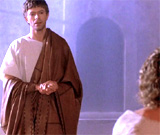
Questioning by Pontius Pilate (David Bowie)
|
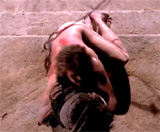
Jesus Whipped and Beaten
|
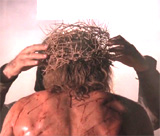
Placement of the Crown of Thorns
|
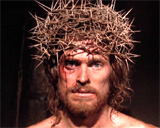
The Crowned 'King'
|
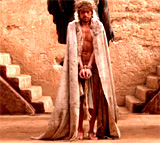
"King of the Jews"
|
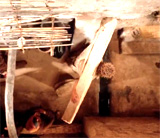
Carrying the Cross-Beam Through Narrow Streets
|
- regarded as a political threat who would bring change
to the way people thought and felt, Pilate ordered Jesus to be
crucified on Golgotha: ("We have a space for you up on Golgotha.
Three thousand skulls there by now. Probably more"); Jesus was
stripped and subsequently beaten and scourged, and a crown of thorns
was placed on his head; Jesus was presented to the crowd - where Peter
was identified as being one of Jesus' followers, but he denied any
association with Jesus: "You must be mistaken. It wasn't me.
It must have been someone else"; Jesus was forced to take a
lengthy, slow-motion walk through Jerusalem's narrow streets and
mocking crowds to Golgotha
- as Mary Magdalene and Jesus' mother Mary
watched, in one of the most heart-wrenching scenes, Jesus' cross
(with him nailed to it) was raised into an upright position (with
the camera mounted upon it) and sunk into a hole in the ground
- and then Jesus, naked and hanging
on the cross during crucifixion, cried out as the camera turned
sideways: "Father, forgive them. Father! Why have You forsaken me?";
a windstorm suddenly turned silent
- a major controversy concerned the 'last temptation'
visionary/hallucinatory sequence that followed, in which the very
human and suffering Jesus was tempted by Satan (portrayed as a
young androgynous guardian angel (Juliette Caton)) as he hung naked
during crucifixion on the cross (after he had uttered: "Father!
Why have You forsaken me?"); he was offered an idyllic vision
or dream by the angel, who claimed he had "suffered enough" after
being tested by a pleased and merciful God, and didn't have to
die. She cited the precedent example of Abraham being told by God
to stop sacrificing his son Isaac. [Note: Jesus' choice to follow
Satan implied that he was a flawed, frail, questioning, tormented
and self-doubting man who was uncertain of the path he should follow.]
- she removed his crown of thorns as
well as the spikes through his feet and wrists - and the angel
tenderly kissed his wounds; he was given life and led away from
an empty cross while he asked doubtfully: "I don't
have to be sacrificed?...I'm not the Messiah?" Onlookers at
Golgotha didn't seem to notice his departure; he was told that
all of his frightened disciples had run away
- Jesus was provided with visions of a "normal" earthly
life, beginning with envisioning his own wedding ceremony in the lush
and green Jordan valley [Note: His "last
temptation" included the blasphemous idea of a sexual relationship
with a woman - with tattooed Jewish prostitute
Mary Magdalene dressed in white]; Jesus was immediately
married to her - and then in a hut in a wooded area, she cleansed
his bloody wounds as he laid naked in her arms, and then, in a non-exploitative
sequence, Jesus made tender, physical love with her as she entreated: "We
could have a child"; after she became
pregnant, she appeared partially naked when at full-term pregnancy
|
Sexual Relationship with Mary Magdalene - Resulting
in Pregnancy
|

|
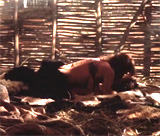
|
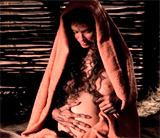
|
- but then, she abruptly passed away one day after
a bright light shined on her; the angel told a sobbing Jesus, who then
stomped away with an axe, that "Who are you going to kill? Are
you going to kill God?...There is nothing you can do. God's
killed her!...God took her away when she was happy. Now she's immortal...You
didn't complain when God let you live. You can't complain now because
he let her die. Trust God's way"; he was assured and consoled:
"There's only one woman in the
world. One woman with many faces. This one falls, the next one
rises"; Mary, Lazarus' sister, would now serve as "Magdalene
with a different face" since she was pregnant with his son -
and so he was taken to live with them; the young angel assured Jesus:
"I'll always protect you. I don't want you
to take the wrong road and get lost again"
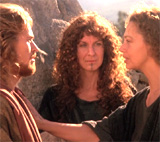
Jesus With the Two Marys Again
|
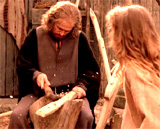
Jesus Confessing His Mistakes to His Guardian Angel
|
- after years working as a carpenter and domestic life,
Jesus confessed to the angel how he had made many mistakes: "I'm
ashamed when I think of it...Of all the mistakes I've made. Of all
the wrong ways I'd looked for God"
- in his town's square, an older
Jesus had a further discussion with proselytizing preacher-apostle
Paul (Harry Dean Stanton) who had a life-altering experience (as
Saul) with God on the road to Damascus by a blinding white light,
and became a born-again Christian after Jesus' sacrifice on the cross;
Jesus asserted that he was the human Jesus, not the one who was tortured,
crucified, and died, but three days later rose up to heaven: "I
was never crucified. I never came back from the dead. I'm
a man, like everybody else..I'm the son of Mary and Joseph. I'm the
one who preached in Galilee. I had followers, we marched on Jerusalem.
Pilate condemned me and God saved me....I live like a man now. I
work, eat, have children. I enjoy my life. For the first time, I'm
enjoying it. Do you understand what I'm saying? So don't go around
telling lies about me, or I'll tell everybody the truth!"
- Paul did not accept his claim and counter-argued
that humanity's "only hope is the resurrected Jesus" through crucifixion,
in order to save the world: "I don't care whether you're Jesus or not.
The resurrected Jesus will save the world and that's what matters"; Jesus
argued back: "Those are lies. You can't
save the world by lying"; Paul ended their discussion with
his trust in a different Jesus: ("Their only hope is the resurrected Jesus!
...You see, you don't know how much people need God. You don't know how happy he can make them.
He can make them happy to do anything. He can make them happy to
die and they'll die. All for the sake of Christ. Jesus Christ. Jesus
of Nazareth. The Son of God. The Messiah. Not you. Not for your sake.
You know, I'm glad I met you. Because now I can forget all about
you. My Jesus is much more important and much more powerful. Thank
you. It's a good thing I met you")
- to reassure himself, Jesus returned to his family
to hug the children and tell Mary and the others: "Don't ever
leave me. I'm happy here"; after Jesus had grown older and was
speaking to the angel about his coming death: (Angel: "We have
to move on. You've grown old. You've done well"),
he heard screams of terror about fighting in Jerusalem: "Jerusalem
is on fire! It's burning! The Romans are killing everyone";
on his deathbed, Jesus had an intervention with the arrival of a
number of his disciples, including Peter, shepherd Philip, John -
and his own betrayer, angry red-haired Judas Iscariot, who called
him the real traitor for not fulfilling his obligation to die on
the cross: "Traitor! Your place was on the cross. That's where God put you. When death
got too close, you got scared and you ran away and hid yourself
in the life of some man. We did what we were supposed to do.
You didn't. You're a coward!...You broke my heart.
Sometimes I curse the day I ever met you. We held the world in our
hands....What are you doing here? What business
do you have here with women, with children? What's good for man isn't
good for God. Why weren't you crucified?" (Jesus' wrists and legs began
to bleed)
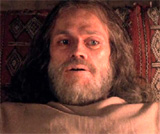
Jesus on His Deathbed
|
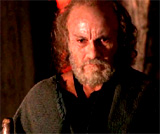
Judas to Jesus: "Traitor! Your place was on the cross!"
|
- Judas also claimed that the guardian angel that was
sent to him wasn't from God but was indeed Satan: ("What angel?
Look at her. Satan"),
confirmed when she turned into a pillar of flames; Jesus
realized the truth of Judas' words that he had been tricked into thinking
he didn't have to sacrifice himself:: ("If
you die this way, you die like a man. You turn against God, your father.
There's no sacrifice; there's no salvation") - Jesus understood
that he must truly sacrifice his life by suffering on the cross for
humanity's sake to save them; Jesus began to crawl from his deathbed
toward the entryway and into the dusty street, as Satan (in voice-over)
urged Jesus to give up: "There's nothing you can do. You lived this
life. You accepted it. It's over now. You just finish it and die. Die
like a man"
- Jesus painfully crawled into the burning city of Jerusalem
(during an attack by the Romans) to again return to the cross, crying
out to his Father-God to take him back and to "pay the price" by
being crucified before rising up: "Father,
will You listen to me? Are You still there? Will You listen to a selfish
and unfaithful son? I fought you when You called - I resisted. I thought
I knew more. I didn't want to be Your son. Can You forgive me? I didn't
fight hard enough. Father, give me
your hand. I want to bring salvation! Father, take me back! Make
a feast! Welcome me home! I want to be your son! I want to pay the
price. I want to be crucified and rise again! I want to be the Messiah!"
- Jesus rejected the temptation that he once accepted
(it was a split-second dream), and returned to die, finding himself
back on the cross to suffer for humanity's sake; in his final moments,
he smiled and closed his eyes after he uttered the triumphant dying
words: "It is accomplished. It is accomplished"
- the film then appeared to run out in the camera -
illustrated by prisms of colored light, and then the burned film
turned bright white, before the closing credits were presented
|

Scrolling Quote From Kazantzakis
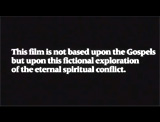
Disclaimer

Nazarene Carpenter Jesus (Willem Dafoe) Constructing Crosses Used for Roman Crucifixion
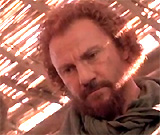
Jewish Zealot Judas Iscariot (Harvey Keitel)
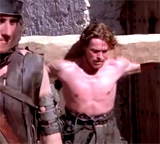
Jesus Carrying a Cross-Bar For a Jewish Rebel's Crucifixion
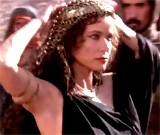
Prostitute Mary Magdalene (Barbara Hershey) Spitting
in Jesus' Face
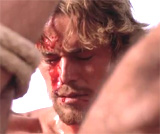
Jesus Sprayed With Blood When Assisting in the Crucifixion of a Rebel
Jew Zealot
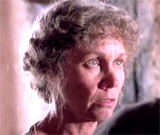
Jesus' Worried Mother Mary (Verna Bloom)
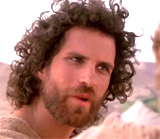
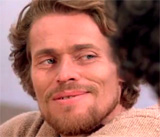
Envious Young Monk Jeroboam (Barry
Miller) From Monastery Encouraging Jesus to Return and Speak to
the People
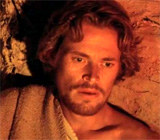
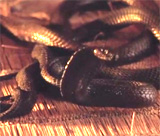
Cobra 'Demons' Appearing to Jesus Before He Was "Purified"
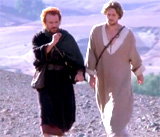
Judas' Vow to Not Kill Jesus Unless He 'Strayed From the Path'
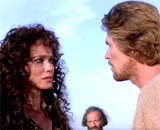
Jesus' Words to Mary Magdalene About Following Him: "Stay here"
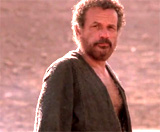
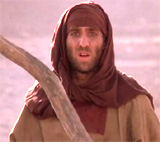
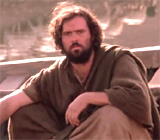
Disciples: Peter, James and Andrew
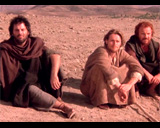
(l to r): John, Jesus and Judas
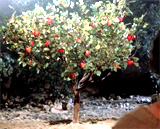
Miraculous Apple Tree
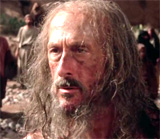
Jesus with John the Baptist Asking: "Who are you?"
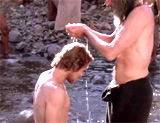
John's Baptism of Jesus
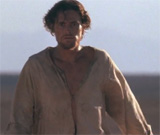
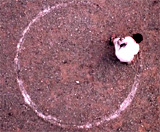
Jesus Trudging Into the Desert to Find Answers - Inside a Circle
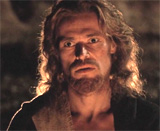
Jesus' Reappearance to His Disciples After Being in the Desert
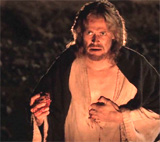
Jesus Pulling His Heart From His Chest To Illustrate a Lesson for His
Disciples
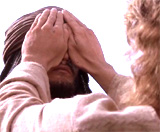
Jesus Healing a Blind Man
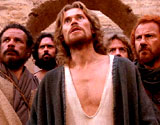
Jesus' Angry Blasphemous Outburst
in the Jerusalem Temple
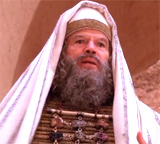
The Rabbi (Nehemiah Persoff) Defending the Money-Changers
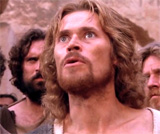
Jesus: "This temple will be destroyed in three days"
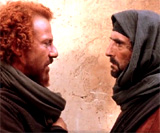
Saul (Harry Dean Stanton) Asking Why Judas Didn't Kill Jesus
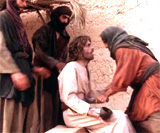
Saul Stabbing Lazarus to Death
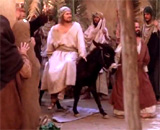
"King of the Jews" Jesus Riding on Colt into Jerusalem - With Palm Branches
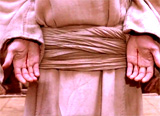
Jesus' Hands Bleeding - A Sign That He Was to Die on the Cross and Sacrifice Himself
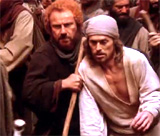
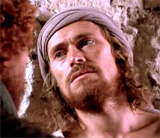
Jesus Re-emphasizing to Judas: "I have to die on the cross"
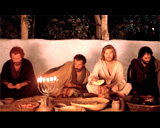
The Last Supper Re-Enactment
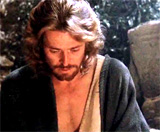
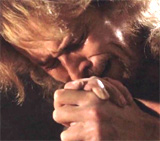
Prayers in the Garden of Gethesemane
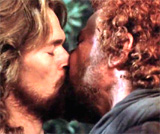
Judas' Betrayal Kiss
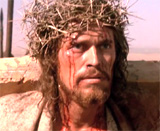
The March to Golgotha
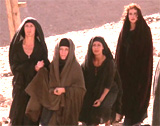
Jesus' Mother and Mary Magdalene Watching
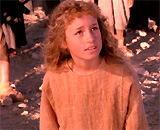
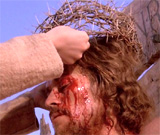
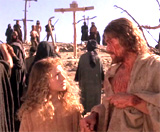
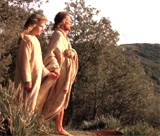
Visionary Sequence During Crucifixion: Jesus Was
Tempted by Young Guardian Angel and Led Away
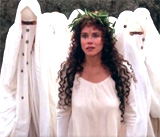
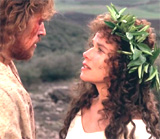
Wedding Ceremony with Mary Magdalene
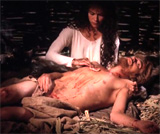
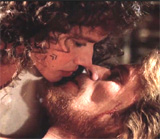
Cleansing His Wounds and Kissing Him
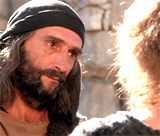
Apostle Paul to Jesus: "Their only hope is the resurrected Jesus"
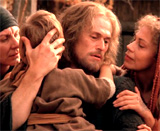
Jesus to His 'Family': "Don't ever leave me. I'm happy here"
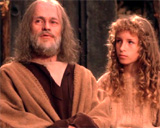
Jesus Growing Older - With the Angel
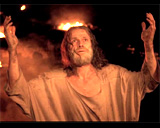
Jesus Crawling Into Jerusalem: "Father, Will You Listen to
Me?"

After The Last Temptation, Jesus Back on the Cross: "It is Accomplished!"
|























































